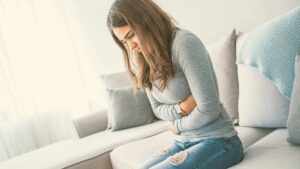Endometriosis affects an estimated 10 percent of women in their reproductive years. Depending on size and location of endometrial growths, symptoms can vary significantly, which is why every woman experiences her life with endometriosis individually different. Diagnosis remains elusive and often takes years. Once diagnosed, women have many questions – here we have assembled the 11 most frequent ones for you.
1 Why does endometriosis cause pain?
Endometriosis causes pain symptoms such as dysmenorrhea, dyspareunia, dyschezia, dysuria, and chronic pelvic pain due to inflammatory reactions and infiltration of anatomic structures. The inflammatory reactions in turn generate highly elevated oxidative stress, which exacerbates pain. Please find here a collection of tips on how to deal with endometriosis-related pain.

2 Is endometriosis curable?
Unfortunately, a cure for endometriosis has not yet been found. Endometriosis management focuses on pain relief and includes medical and surgical treatment, with pharmacologic therapies like combination oral contraceptives, danazol, GnRH analogues, and progestins. Many women also adopt lifestyle and dietary changes to improve their symptoms.
Research tries to understand more about the cellular and molecular mechanisms to identify novel therapeutic approaches and potentially curative treatments.
3 Is endometriosis genetic?
Endometriosis is considered to involve multiple genetic, environmental, immunological, angiogenic, and endocrine processes, with susceptibility genes remaining largely unknown.
4 Is endometriosis cancer?
Fortunately, endometriosis is generally benign, but malignant transformation has been documented in some cases.
5 Is endometriosis an autoimmune disease?
While endometriosis is not considered an autoimmune disorder in the classical way, autoimmunity is associated with endometriosis, with some women showing chronic local inflammation and autoantibodies.
6 Are endometriosis and adenomyosis the same?
Both adenomyosis and endometriosis have altered inner myometrium, and in some subgroups, the two conditions often coexist. However, adenomyosis is not simply endometriosis of the uterus, and may require interventional procedures different from those for endometriosis to achieve the best results.
7 Are endometriosis and fibromyalgia related?
Endometriosis is often associated with other painful conditions like fibromyalgia. Several links have been debated. One link may be that there are concerns that gonadotrophin-releasing hormone analogue treatment for endometriosis may cause fibromyalgia, as seen in a case of widespread pain, sleep difficulties, and neuropsychological complaints. In addition to that, endometriosis is associated with elevated stress levels, which may contribute to the progression of fibromyalgia.
8 Does inflammation come with endometriosis?
Endometriosis causes inflammation and increased oxidative stress in the vicinity of endometriomas
9 Can diet change halt endometriosis symptoms?
While there is no such thing as a 100 % guarantee, many women find that their symptoms diminish significantly after diet change. Many also use supportive supplementation to counteract inflammation and elevated oxidative stress.
10 Can you still get pregnant if you have endometriosis ?
Yes, approximately two thirds of women with endometriosis get pregnant without any problems. About one third of women with endometriosis will need some medical assistance to get pregnant. Safe and effective treatment options are available.

11 What is the IVF success rate with endometriosis?
Women with endometrioma undergoing IVF/ICSI have similar reproductive outcomes compared with those without the disease, According to research, a combined surgical and pharmacological endometriosis treatment has a positive impact on IVF reproductive outcomes, both on pregnancy and on live birth rates.







